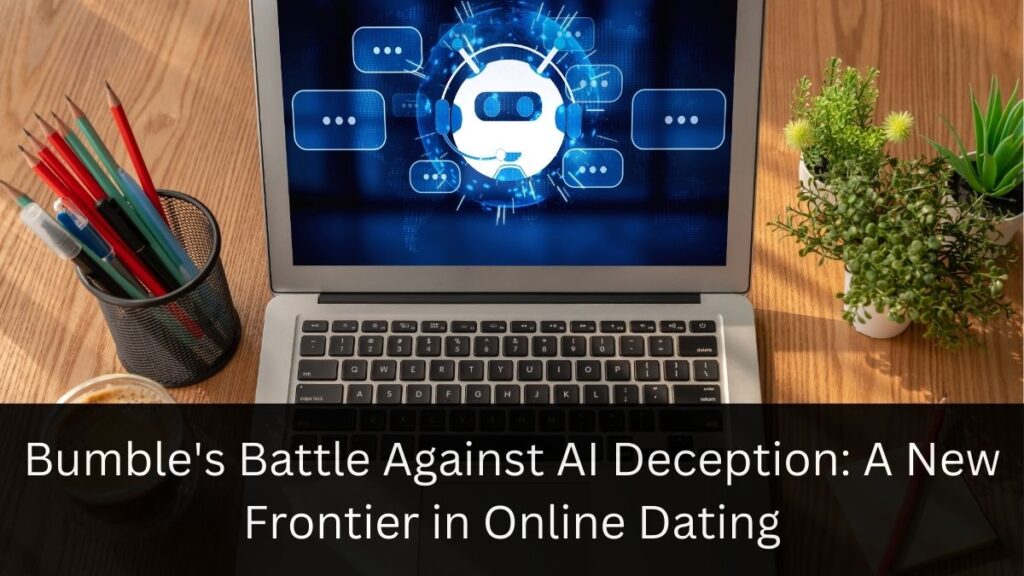In the ever-evolving landscape of online dating, a new challenger has emerged: artificial intelligence. As AI-generated content becomes increasingly sophisticated, dating apps like Bumble are facing a unique set of challenges. The line between authentic connection and digital deception is blurring, and Bumble is taking a stand.
The Rise of AI in Online Dating
The world of online dating has always been a minefield of potential misrepresentation. From carefully curated profiles to strategically angled selfies, users have long sought to present their best selves – sometimes at the expense of complete honesty. But with the advent of AI-generated photos and videos, the game has changed entirely.
Imagine swiping right on what appears to be your dream match, only to discover that their chiseled abs and yacht-owning lifestyle were conjured up by an algorithm. It’s a scenario that’s becoming all too common, and it’s one that Bumble is determined to address.
Bumble’s New Weapon: User-Powered Reporting
In a bold move, Bumble has enlisted its users in the fight against AI deception. The company recently introduced a new reporting option that allows members to flag profiles suspected of using AI-generated photos or videos. This addition to their existing reporting system, which already covers issues like inappropriate content and underage users, represents a significant step in combating digital dishonesty.
Risa Stein, Bumble’s vice president of product, emphasized the importance of this new feature: “An essential part of creating a space to build meaningful connections is removing any element that is misleading or dangerous.” Her words underscore the company’s commitment to fostering genuine interactions in an increasingly artificial online world.
The Deception Detector: AI Fighting AI
But Bumble isn’t stopping at user reports. The company has also deployed its own AI tool, aptly named “Deception Detector.” This sophisticated system combines artificial intelligence with human moderation to identify and remove fake profiles, spammers, and scammers.
The results have been impressive. Since its launch in February, Bumble reports a 45% decrease in member reports of spam, scams, and fake profiles. It’s a testament to the power of technology when used for positive ends.
The Broader Implications
The introduction of these new features raises intriguing questions about the future of online dating and digital interactions more broadly. As AI becomes more pervasive, how will we navigate the increasingly blurred line between real and artificial?
From a personal perspective, I find myself both fascinated and slightly unnerved by these developments. As someone who has dabbled in online dating, the thought of AI-generated profiles adds an extra layer of complexity to an already challenging endeavor. It’s reassuring to see companies like Bumble taking proactive steps, but it also highlights the need for users to remain vigilant and critical in their online interactions.
The Future of AI in Dating: Friend or Foe?
Interestingly, while Bumble is fighting against certain uses of AI, the company’s founder, Whitney Wolfe Herd, has some rather avant-garde ideas about its potential applications. In a recent interview, Herd floated the concept of AI “dating concierges” – virtual assistants that could go on hundreds of dates on your behalf to find the perfect match.
This futuristic vision raises a host of ethical and practical questions. Would such a system truly be able to capture the nuances of human connection? And if it could, would we want it to? The idea of outsourcing our romantic lives to AI might seem efficient, but it also feels at odds with the very essence of what makes relationships special – the unpredictability, the chemistry, the human touch.
The Human Element in a Digital World
As we grapple with these questions, it’s crucial to remember the fundamental purpose of dating apps: to facilitate human connections. While AI tools can enhance user experience and safety, they should never replace the authenticity and vulnerability that are essential to forming meaningful relationships.
Bumble’s approach – leveraging both AI technology and human insight – seems to strike a balance. By empowering users to report suspicious activity and backing it up with sophisticated AI detection, the company is creating a more trustworthy environment for digital courtship.
A Call for Digital Literacy
The rise of AI-generated content in dating apps underscores a broader need for digital literacy. As users, we must become more discerning consumers of online content, whether it’s on dating apps, social media, or news sites. The ability to distinguish between authentic and artificial content is becoming an essential skill in the digital age.
To this end, perhaps dating apps like Bumble could consider incorporating educational elements into their platforms. Brief tutorials on spotting AI-generated content or tips for safe online dating could go a long way in empowering users to navigate this new landscape.
Conclusion: Embracing Authenticity in the Age of AI
As we move forward into an increasingly AI-driven world, the challenge for dating apps – and for all of us – will be to harness the benefits of this technology while preserving the authenticity of human connection. Bumble’s recent initiatives represent a step in the right direction, but they are just the beginning.
The future of online dating will likely be a complex interplay of human intuition and artificial intelligence. As users, we must remain engaged, critical, and open-minded. We must embrace the tools that enhance our experiences while never losing sight of what truly matters – genuine human connection.
In the end, no amount of AI sophistication can replicate the spark of a real connection. As we swipe, chat, and meet in this brave new world of digital dating, let’s remember to bring our authentic selves to the table. After all, it’s our uniquely human qualities – our quirks, our passions, our imperfections – that make us truly attractive.

